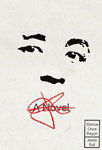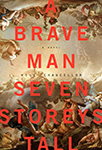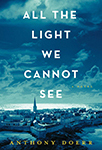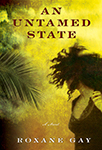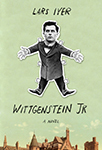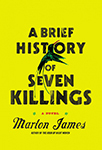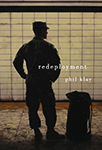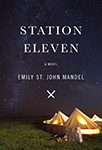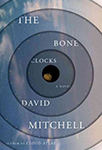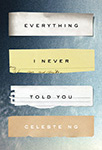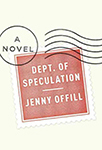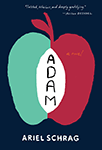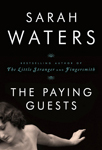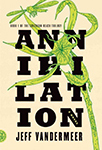by Jesse Ball
30% OFF at Powell’s »Elisabeth Donnelly: For work, I read nonfiction, so the opportunity to read great fiction from 2014 was wildly appealing, making my brain feel like it was vacationing at a spa. The two books that came my way, Lars Iyer’s Wittgenstein Jr and Anthony Doerr’s All the Light We Cannot See didn’t have much in common on the surface; one slim and comic, the other a wartime epic.
We’ll start with the epic. All the Light We Cannot See has some name recognition: It was a finalist for the National Book Award, and the attention, and likely word-of-mouth enthusiasm, too, has turned it into a bestseller, with whole walls in chain bookstores devoted to its blue cover. My mother asked me about it recently.
It is, however, empirically impossible to describe All the Light We Cannot See without making it sound like a film starring a French pixie like Audrey Tautou, twee and suffused with whimsy. Part of this is due to the book’s plot, about the intertwined fates of Marie, a blind French teenager, and Werner, a German soldier in World War II. Part of it is the book’s obsessions: locks, jewels, snails, miniature models, shortwave radios, Jules Verne. On top of it, the book is so specific, so alive and steeped in French-ness, that it’s truly confusing to look at the author photo and see Doerr, a hale, happy American in Idaho. If the world made any sense he should be more like Antoine Doerre, dour of face, mustachioed, beret’d, and holding a baguette.
Written in a series of scenes that span a couple of pages apiece, All the Light We Cannot See starts from a place of urgency: Bombs are falling over the walled city of Saint-Malo, with “the girl” (Marie) and “the boy” (Werner) in peril. The chapters switch back and forth between their perspectives, with interjections from some other characters. The book then goes back in time to show us how Marie and Werner got to this place, writing beautifully about Marie’s descent into blindness and her father’s quest to make her self-sufficient, able to live a life without him. You can envision Marie’s Paris, with days in the Museum of Natural History, nights learning Braille and lock-work with her father. Doerr writes gorgeous sentences, like this one about Marie’s father: “He glows sapphire when he sits over his workbench in the evenings, humming almost inaudibly as he works, the tip of his cigarette gleaming a prismatic blue.”
On the other side, Werner, a plucky German orphan (see? #notallnazis) lives a lonely life in the foster home with his sister Jutta. But he has one obsession that keeps him curious: the radio. When he finds one, he fiddles, making it talk. It’s that talent that will change his fate—instead of a life of drudgery and certain death toiling in the mines, he’s plucked into the Hitler Youth, training for a better tomorrow. Werner’s road is trickier. He is not as emotionally true and expressive as Marie. Yet we keep turning the pages as Doerr shows a runt becoming useful, wondering whether that usefulness will have a purpose.
I am not mentioning the book’s weak link, something about a rare jewel and the mad German who’s after it, although it does turn the wheels of plot.
Doerr is able to take the subject of love and show us how it makes us human when the world is mad, brutal, and unfair, ruined by war and violence. It’s similar to the way Marie describes her great-uncle: “… he was once a young man who dwelled in the world and loved it as she does.” You close the book with surging emotions, something like faith, and for that, All the Light We Cannot See is a feat.
On the surface, Lars Iyer’s Wittgenstein Jr is the opposite of Doerr’s epic: a campus comedy, a slim novel about a group of young Cambridge men in a philosophy class, taught by a teacher they deem “Wittgenstein Jr.” It’s written in the first person plural, mostly from the point of view of the one poor “Northerner,” Peters. The other classmates are archetypes, from “rich” to “twins.” Wittgenstein has a past, including a dead brother—also a philosopher—but the professor himself is a collection of logic games and rants against The Academy.
Philosophy’s aims clash with the boys’ need to blow off some college steam, drinking at parties and creating their own silly performances out of thin air:
How open our lives are, just as Wittgenstein says! Anything might happen! We are lost. Lost in the middle of life. We feel vulnerable—alone and exposed, falling deeper and deeper into Time.
We may have sniffed too much amyl nitrate last night, Ede says.
Iyer is a smart writer, and I giggled at some of the comic repetition (logic, or logik becomes absurd in his hands) and the boys goofing off. If you are a fan of David Foster Wallace: The Philosophy Grad Student Years, this book is your soulmate. Yet it suffers from a lack of a center. As the story moves, roughly, from comedy—philosophy’s grandeur battling graduate existentialism—to love story, and the first person plural switches, it has half of the emotional punch that it could have, seen elsewhere in books like Joshua Ferris’s Then We Came to the End.
As finely put together as a watch, Wittgenstein Jr is a playful book of ideas by a brilliant man. It was the underdog coming into the matchup, and I was ready to give it the win if it touched me, if it was a book that I enjoyed and found moving. But Iyer’s college students remained opaque and evanescent, and the hero worship of Wittgenstein that turns into something more did nothing for me as a reader. I closed the book thinking that academia was a joke and college is worse, forgetting any of the narrator’s motivations.
Sadly, it really wasn’t much of a battle. In comparison to Wittgenstein Jr’s coldness, All the Light We Cannot See starts the reader right in the thick of it, with Marie and Werner facing certain death as bombs are falling over Saint-Malo. You worry about the fate of these teens, and as Doerr goes back into the past, tracing how their lives got to this point, you care about them. Doerr writes characters with passion, flush with love for people and for things—from locks to the radio—and you want them to live. You want them to thrive. It was the depth of feeling that swayed me over to Doerr’s book; even in the parts where it overreached, I cared, and I wanted to know what would happen to Marie and Werner. I wanted them to find something good in the horrors of war, and perhaps that usurps the horrors of college. I had to go with the book that kept me up at night: All the Light We Cannot See.
John: Before we jump into our thoughts on the match, we should probably spend some time discussing our decision to violate our longstanding rule of not allowing writers with connections to The Morning News to compete in the Tournament of Books by including Anthony Doerr. Doerr’s work for the site dates back to 2005, and he was a ToB judge from 2006 to 2009.
We get to call him Tony.
It’s not quite like if we included books by you, or me, or Rosecrans Baldwin, since we all have direct influence on what gets selected for the tournament, but it’s the next level down. There’ve been a number of books by TMN contributors over the years that have been eminently Rooster-worthy—Pasha Malla’s novel from last year, People Park, would’ve been on my personal short list for this year—but we’ve excluded them as a matter of course.
And at first, we did the same to All the Light We Cannot See.
But then we realized how stupid that would be. Tony’s book is The Goldfinch of 2014, the best-selling literary fiction title of the year. I bet it’s probably the best-selling literary title of 2015 so far as well. It seems to have Gone Girl-like legs, and I don’t know a single reader who hasn’t been charmed by it, including me.
Kevin: There was quite a vigorous debate over this (in the Brian Williams retelling of it, you were shivved by a letter opener), so I feel like we still take the integrity side of this goofball event seriously. Ultimately, All the Light We Cannot See would have been conspicuous by its absence from the contest. Its exclusion would have arched more eyebrows than its inclusion. I have no doubt it was the right decision.
Also, although I feel like I know Tony through The Morning News, I don’t think I’ve ever been in the same room with him. I have read a lot of his work, however, so I can’t say I was surprised that this novel is good. And my high expectations did nothing to temper my enthusiasm for it.
It’s also not hard to see the appeal this novel had for someone like Judge Donnelly, who reads a great deal of nonfiction. Doerr had to have done an impressive amount of research—not just for the incredible period details, but also, as Judge Donnelly describes, for dozens of marvelous tangents on arcane subjects. There is also the great care he has taken with every sentence, and the way he has honed the structure of this book to maximize the voice and tempo. In a time when many writers are pressured to crank out the manuscripts for fear of losing whatever share of the dwindling reading audience they possess, it is a joy to read a novel that has been nurtured the way this one has, and it also has been a joy to cheer on its success.
Judge Donnelly found the story of hunt for the rare jewel to be the story’s “weak link.” I personally found it to be tremendously appealing. On the surface I suppose you could say that Nazis hunting artifacts with mythical powers has more than a whiff of Indiana Jones, but I could use more whiffs of that stuff. From a writerly standpoint, what it really did was give the novel a personal villain (as opposed to just “fascism” or “war”) and a reason for Werner and Marie to eventually meet and unite. I thought it was slickly done.
John: I found Wittgenstein Jr super smart and funny. I don’t care for blurb-speak, but “rollicking” seems to fit. Iyer’s style involves a kind of shorthand, where, in the almost polar opposite of Doerr’s method, scenes are set with the barest of stage directions, less even than a screenplay, before firing the voices of these young philosophers at us rat-a-tat. It’s lively, fun, and unlike just about anything you’ll find being published today.
Of course, this makes the chances of it becoming a widely beloved bestselling work of literary fiction exactly nil, which only increases my respect for Iyer, whose previous trilogy of novels, Spurious, Dogma, and Exodus are all great.
We need writers like Tony Doerr and Lars Iyer. I think All the Light We Cannot See has earned Tony the security to write whatever compels him. I hope fortune shines on Lars Iyer in a way that makes the same thing possible.
Kevin: Tomorrow, we finish the top half of the bracket as your personal favorite book of the year, John, A Brave Man Seven Storeys Tall, goes up against a novel that has to be considered the heavy favorite, maybe even a favorite to win it all, The Paying Guests.
John: I’m chewing my knuckles to the bone rooting for my preferred outcome.


